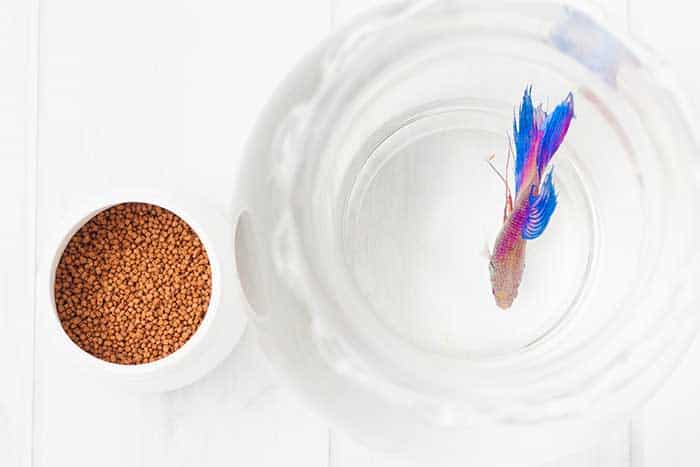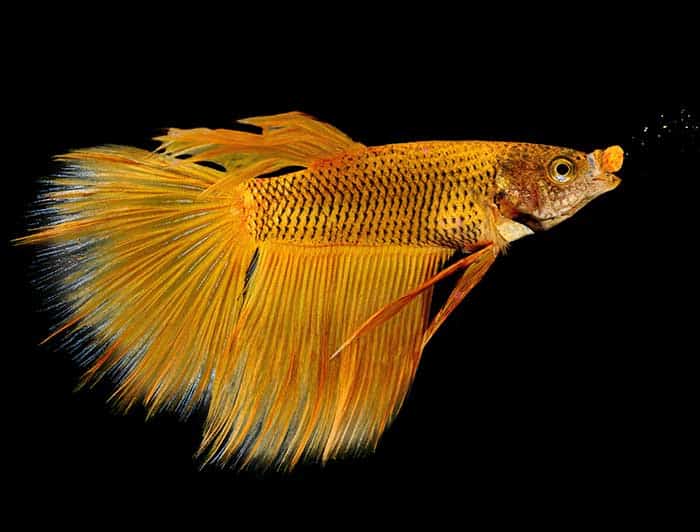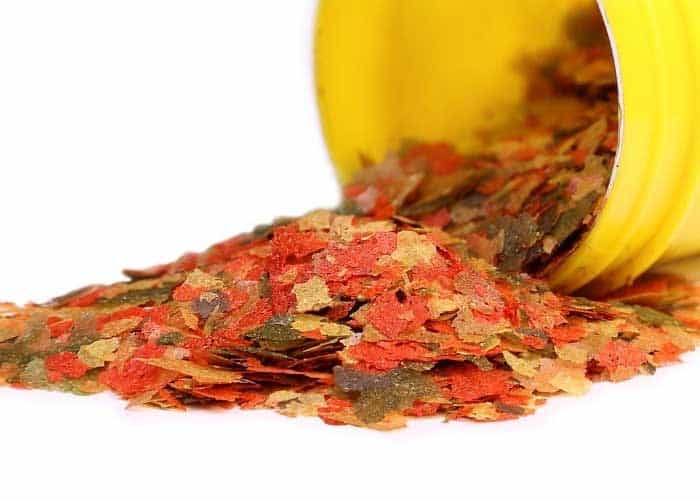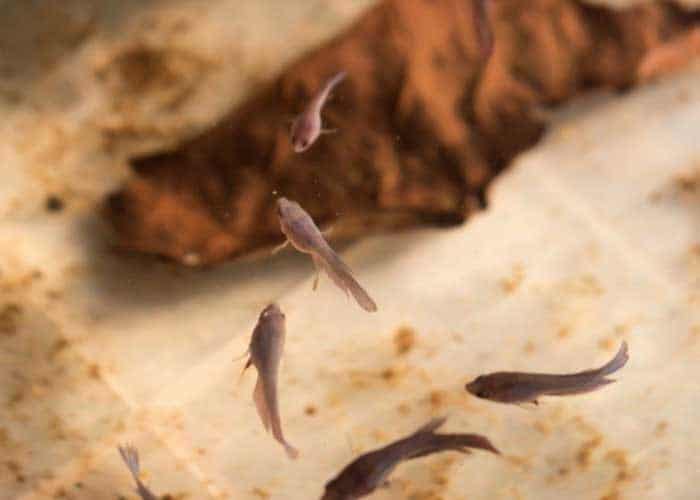How Oftrn to Feed Little Betta
If you keep betta fish or are thinking about getting your first betta fish, there are several things you will need to know so that they can have a healthy and happy life with you. Two essential factors are learning how often to feed betta fish and what to feed them.
Overfeeding betta fish can cause problems with bloating and constipation, and the excess food will usually sit at the bottom of the tank, where it will rot away and cause ammonia spikes to occur in your aquarium water.

'Links on this page that lead to products on Amazon, Chewy, or other retailers are affiliate links and I earn a commission (at no extra cost to you) if you make a purchase. Huge thanks for supporting this site!'
Underfeed your betta, and it will probably get cranky and show signs of stress, which may lead to other illnesses.
Throughout this guide, I will answer the most common questions about feeding your betta fish, such as "How often to feed betta fish?", "What do betta fish eat?", and "What are the best foods for betta fish?" I will also provide an example betta fish feeding chart.
If you make it to the end of this article, you will know everything you need to know about feeding your betta fish.
How Often Should I Feed My Betta Fish
Betta fish typically do best with two meals daily because they have small digestive systems and don't like to eat big meals. You can feed them once a day, but splitting the daily ration into two meals is best to keep their digestion moving nicely.
Siamese fighting fish can be picky eaters and generally only eat what they need while the food sits at the top of their tank. Betta fish are not bottom feeders; if their food is left uneaten for too long, it will usually sink to the bottom.
How Much Should I Feed My Betta Fish
A good rule of thumb when deciding how much to feed your betta fish is only to give them as much food as they can eat in three minutes. This means you should only put a small pinch of food into their tank at each feeding.
A betta fish's stomach is tiny, estimated to be about the size of its eye, so it doesn't take too much food to fill them up. Splitting feeds into two or even three per day is much more beneficial for your betta fish.
It is wise to vary the types of food you feed your betta as it will keep them interested and meet their nutritional requirements much better. I will cover their dietary requirements in the following sections.
What Do Betta Fish Eat
Betta fish are carnivores, and their diet should consist mainly of protein-rich meaty foods such as brine shrimp, mosquito larvae, bloodworms, and daphnia. These fighter fish foods are all high in protein and will help your betta fish grow and stay healthy.
Betta fish will also eat plant-based foods to aid their digestion, so in a way, they can also be considered omnivores. Plant-based foods are not a required part of their diet for healthy growth, but they are something wild bettas will eat, so I recommend that you also include them.
What Can You Feed Betta Fish
You can feed a betta fish various foods, especially live, frozen, or freeze-dried natural foods. You can also feed them betta pellets which are high in protein and specifically designed to contain all of the nutrients that your betta requires for good health.
Live foods are the best choice for feeding betta fish. It's what they eat in the wild, instinctively making them hunt their food. A good quality frozen food should also retain most of its nutritional value and enable you to keep a good stock of it.

The only concern about live or frozen betta food is its source. Specific food sources can carry parasites and other bacteria as they are used as an intermediate host until reaching the digestive system of a bigger predator like your betta fish.
Live betta food is the biggest concern. Once ingested, a parasite will attach to the digestive tract of your betta fish. The parasite will feed and make your betta unwell, and in worst cases, it will bore through your betta's stomach, infecting other organs, eventually killing your betta fish.
Frozen foods are also a risk for parasites, and many bacterias will lay dormant when frozen, waking up when temperatures return to normal.
Freeze-dried foods are the safest option, but I wouldn't recommend using them exclusively as they have a lower nutritional value. Freeze-dried food is less nourishing due to the freeze-drying process, but the process also makes dry food sterile, killing all parasites and bacteria.
What Can Betta Fish Eat Of Human Food
Betta will eat human foods such as vegetables and salads. Lettuce and peas are favorites. It is best to avoid feeding your betta any meats like chicken or beef as they can be harder to digest than the proteins that betta are used to, such as insect larvae, worms, and flies.
When preparing vegetables for a betta fish, your should boil them until soft and squash them until mushy. Betta fish do have tiny teeth, but their mouths are pretty small.
If your betta has constipation, peas are a great way to relieve the blockage. Constipation is quite common in betta fish, leading to issues such as swim bladder disorder.
You can read about betta constipation here. How To Tell If Your Betta Fish Is Constipated (Causes and Treatments).
If you want to add some plant-based food to your betta's diet, you can try the below:
- Boiled peas
- Sweetcorn
- Lettuce
- Spinach
- Cabbage
And some fruit that is not too citrus, such as:
- Melon
- Strawberry
- Pear
- Apple
- Berries
Feel free to experiment with your betta's diet, as you may be surprised at what they will eat. Make sure to give in moderation if it's outside their main dietary requirements.
Can Betta Fish Eat Tropical Flakes
Betta fish can eat tropical flakes, but I would not advise it regularly. Fish flakes are not nutritional enough for a betta fish, and they will also sink quickly to the bottom, where a betta will not usually feed.

You can purchase specifically made betta flakes that are better suited to their nutritional requirements but will also sink unless given slowly. Betta fish pellets are a better option as they will float on the surface for longer.
If you are all out of betta food, regular tropical flake food will be ok to fill a gap until you re-stock.
How Many Flakes To Feed Betta Fish
If you are feeding flakes to your betta fish, I would recommend only a few as a supplement to their diet. 3-4 flakes per betta fish, twice a day, and feed them one at a time, so they are consumed before sinking.
When adding tropical flakes to most community fish tanks, you can sprinkle the flakes quite liberally because the sinking flakes will reach mid-level and bottom feeders.
Best Food For Betta Fish
As I have already mentioned, the best food for betta fish is live food or live food that has been frozen or freeze-dried. I have also given a few examples of what betta fish prefer to eat, but in this section, I will provide a comprehensive list to choose from.
Here is a list of the best food for betta fish:
- Brine Shrimp
- Mosquito Larvae
- Bloodworms
- Mysis Shrimp
- Daphnia
- Wingless Fruit Flies
- Tubifex Worms
All of the above are ideally suited to a betta fish's diet and can be purchased as frozen food to be stored in a freezer until needed.
Most betta owners will use pellet food for 50-60% of feeds which is good practice, and you should choose specifically formulated betta fish pellets as they will contain a high level of crude protein.
Important Note
Always remember to soak betta pellets before feeding to help soften them. Pellet food will absorb water and expand, which you will want to avoid happening inside your betta's stomach, where it may cause a blockage.
Below is a useful video I found on Youtube which talks through many of the food types that betta fish will eat.
How Often Should You Feed A Betta Fish Bloodworms Or Other Live Foods
Betta fish can eat bloodworms every day if you wish, but I would recommend every other day as a treat. Bloodworms are high in protein and fat, which is unsuitable for a betta's health if given too often. The same is true for Brine shrimp and Mysis shrimp, so they should be given on alternate days to pellets.
Daphnia can be given daily as it is low in protein and fat. Daphnia is also very small, so a betta will only eat a few at a time. Daphnia is also great for reducing bloating and constipation.
It would be best to provide your betta will specialized betta pellets that contain added vitamins and minerals specific to your betta's requirements and provide live, frozen, or freeze-dried foods about three times a week.
Betta Fish Feeding Chart
There is no set requirement for feeding betta fish. In the wild, betta fish eat what they can get, when they can get it, however, during their time in captivity, betta owners have refined their diets to give them the best health and improve their betta fish's lifespan.
The two feeding charts below will give you an idea of how best to feed your betta fish throughout the week, but feel free to experiment and decide upon your own feeding schedule based on your betta's requirements. A varied feeding routine will stop your betta from getting bored with its food.
Example 1 Betta Feeding Chart
| Week Day | Food Type |
|---|---|
| Monday | Betta Pellets (9 AM) Betta Pellets (6 PM) |
| Tuesday | Betta Pellets (9 AM) Brine Shrimp (6 PM) |
| Wednesday | Betta Pellets (9 AM) Betta Pellets (6 PM) |
| Thursday | Betta Pellets (9 AM) Blood Worms (6 PM) |
| Friday | Betta Pellets (9 AM) Betta Pellets (6 PM) |
| Saturday | Betta Pellets (9 AM) Brine Shrimp (6 PM) |
| Sunday | Fasting Day (No Food) |
Example 2 Betta Feeding Chart
| Week Day | Food Type |
|---|---|
| Monday | Tubifex Worms (10 AM) Betta Pellets (8 PM) |
| Tuesday | Betta Pellets (10 AM) Brine Shrimp (8 PM) |
| Wednesday | Betta Pellets (10 AM) Betta Pellets (8 PM) |
| Thursday | Betta Pellets (10 AM) Betta Pellets (8 PM) |
| Friday | Blood Worms (10 AM) Betta Pellets (8 PM) |
| Saturday | Betta Pellets (10 AM) Mysis Shrimp (8 PM) |
| Sunday | Fasting Day (No Food) |
As you can see from the examples, there is no set feeding time or food type. Routine is key when it comes to feeding times, you do not need to keep feeds 12 hours apart. I wouldn't recommend giving Tubifex Worms and Blood Worms on consecutive days, nor would I give Brine Shrimp and Mysis Shrimp on consecutive days.
You do not have to include a fasting day, but if your betta suffers from constipation, you should definitely consider it. Fasting for one or two days a week is good practice for most fish as it gives the digestive system time to rest. Your betta won't go hungry as they will scour the tank for left-over food and will eat snails or other pests.
Lastly, if you only have Brine Shrimp or Blood Worms, it will be fine, just consider changing it up if your betta loses interest.
Why Won't My Betta Fish Eat
If you find your betta not eating, this is a sure sign that something is wrong. There are several reasons why your betta fish won't eat at feeding time, some more serious than others.
Below are some common reasons why your betta fish won't eat:
- Stress – Betta fish don't cope well with stress and will often withdraw. If your betta is very stressed, you may notice horizontal lines suddenly appear along its body, known as stress stripes on betta fish.
- Diet – If your betta's diet isn't varied enough, it will be bored with what it is eating or may suffer from digestive problems. It would help if you gave plenty of natural betta fish food to avoid constipation that too many betta pellets can cause.
- Lighting in the tank – The amount of light or the type of light your betta gets throughout the day can impact your betta's health. Keeping your betta tank light on throughout the night can upset your betta's sleep cycle and circadian rhythm, which controls many of the necessary biological processes. Betta fish also prefer wavelengths of light, specifically blue and red, which impact appetite, digestion, and specific biological processes. Betta fish can see in the dark so you can safely switch the light off for 8-12 hours.
- New Tank Syndrome – New tank syndrome is a condition many fish suffer from, brought on by unstable tank conditions or getting introduced to a tank with water parameters vastly different from their natural environment. Betta fish are particularly susceptible to new tank syndrome as they are such fragile creatures.
- Lack Of Oxygen – If there is a lack of oxygen in the water, your betta will become stressed and may not eat. The simple fix for this problem is to increase oxygenation in your aquarium by using an air pump or increase the surface water agitation using your aquarium filter.
- Sickness or Disease – Is your betta fish sick? Sickness is a common reason why your betta won't eat. Many illnesses can affect your betta fish, including bacterial infections such as betta fin rot and parasites such as betta white spot or ick. If your betta fish is behaving differently by swimming strangely, looking sluggish, pale, or spending a lot of time at the top or bottom of the tank, you probably have a sick betta. Whether an illness makes your betta feel a little lousy or causes lots of discomfort, it is unlikely to eat until you identify and treat the problem.
- Environment – If your betta is unhappy in its tank, it will become stressed and stop eating. Several reasons your betta may not be happy in its tank include poor water quality, lack of hiding places, insufficient plants, bullying from other fish, or your betta's tank is too small. Making some simple changes to your aquarium setup can solve the problem. Is your betta tank too cold? This can affect a betta's metabolism and reduce its need for eating.
Although I have briefly outlined the issues above, I would recommend that you read my article: Why Won't My Betta Fish Eat? – 6 Possible Reasons Why, which discusses each of the reasons mentioned in much more detail.
How Often Do You Feed Baby Betta Fish
You should feed baby betta fish fry small amounts of a suitable food source 4-5 times per day until 5-6 months of age. Feed them live baby brine shrimp as they are full of nutrients and can be added to the tank as a constant food source to be eaten when your betta fry are hungry.

Brine shrimp breed quickly, so you can set up a small breeding tank and have a ready-made food source for your betta fry. You can feed frozen or freeze-dried baby brine shrimp to your betta fry or buy a commercial brand of baby betta food. Neither will be as nutrient-rich and if you add too much to your betta's tank, it will quickly rot and upset your aquarium water parameters, unlike live food.
How Much Do You Feed Baby Betta Fish
If you are using live food, you can add enough to your baby bettas tank, so a consistent food source is available. Your baby bettas will only eat when they are hungry. If you are using frozen or freeze-dried food, you should only add a small pinch that will not go uneaten, 4-5 times per day.
When betta fish are in the early stages of life, they will only need a tiny amount of food to fill their extra small stomachs, but as they grow, you can increase the amount you feed them. Just take note of how much food sinks and goes uneaten as it will release ammonia into the tank as it rots.
If you have baby betta fish and want a complete guide on how to care for them (including feeding tips), you can read an article I wrote here: Baby Betta Fish (Care and Feeding Guide).
Wrap Up
I hope this betta fish feeding guide has given you a better understanding of the food types best suited to betta splendens. Most tropical fish owners will typically feed only flakes of pellets, which is fine in most community tanks with a variety of fish, whereas a betta's diet will certainly benefit from some live or frozen food.
Keeping healthy fish and avoiding serious health problems is your priority as an aquarist. Understanding how often to feed betta fish, and knowing the best food types with the highest nutritional benefits, will provide your betta with a healthy diet, aiding in good growth and a healthy life.
Frequently Asked Questions
Source: https://www.fishkeepingacademy.com/how-often-to-feed-betta-fish/
Post a Comment for "How Oftrn to Feed Little Betta"